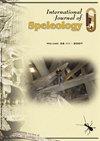Stratigraphical influence on chalk cave development in Upper Normandy, France: implications for chalk hydrogeology
IF 1.3
4区 地球科学
Q3 GEOSCIENCES, MULTIDISCIPLINARY
引用次数: 2
Abstract
Classically, the Upper Cretaceous Chalk Group aquifer of northwest Europe is conceptualized as a homogenous dual-porosity aquifer, with high porosity related to its fine-grained porous matrix, and intermediate hydraulic conductivity associated with fractures. However, an increasing number of hydrological studies visualize the Chalk as a heterogeneous karst aquifer due to the localised presence of dissolutionally enlarged conduits. Field investigation suggests that cave development is guided by distinct stratigraphical and tectonic discontinuities within the rock mass. Identifying which potential inception horizons within the Chalk aquifer are favoured, and why, is important for developing future robust conceptual models of groundwater behaviour. This study focusses on the Chalk of the Upper Normandy region in France where karstic conduits are common and are linked to major sources of groundwater for public water supply. We analyse the geometry and geomorphology of six chalk caves exposed in the Seine Valley with an aggregated length of over 5.7 km, along with other caves in southern England, and identify the key inception horizons associated with their development. The data shows that prominent Turonian, Coniacian and Santonian hardgrounds have influenced the development of 68% of the studied caves length, with sheet-flints and marl seams also playing a prominent role. Caves developed on or between hardgrounds typically display a complex interlinked anastomotic passage network, whereas passages subjected to paragenetic conditions caused by a high sediment flux tend to be concentrated into fewer, larger conduits. The new evidence from Normandy and Southern England demonstrates the role of lithostratigraphy, and in particular stratigraphical discontinuities on conduit development. The data reinforces the idea that the Chalk aquifer should be viewed as a heterogeneous triple porosity karstic aquifer, in which conduit development is influenced by key stratigraphical discontinuities. This improved conceptual model can be used to develop better groundwater flow models and improved catchment delineation.地层对法国上诺曼底白垩溶洞发育的影响:对白垩水文地质的启示
从传统意义上讲,西北欧的上白垩纪白垩系白垩系含水层被概念化为均质双重孔隙含水层,其高孔隙度与其细粒多孔基质有关,中等导水率与裂缝有关。然而,越来越多的水文研究将Chalk视为非均质岩溶含水层,因为局部存在溶解性增大的管道。现场调查表明,洞穴的发育受岩体内不同的地层和构造不连续性的指导。确定Chalk含水层内哪些潜在的起始层位是有利的,以及为什么,对于开发未来可靠的地下水行为概念模型很重要。这项研究的重点是法国上诺曼底地区的白垩岩,那里的岩溶管道很常见,并与公共供水的主要地下水来源相连。我们分析了塞纳河流域六个白垩洞穴的几何形状和地貌,这些洞穴的总长度超过5.7公里,以及英格兰南部的其他洞穴,并确定了与它们的发展相关的关键起始层位。数据显示,突出的Turonian、Coniacian和Santonian硬地影响了68%研究洞穴长度的发育,片状燧石和泥灰岩矿层也发挥了重要作用。硬地上或硬地之间发育的洞穴通常显示出复杂的相互连接的吻合通道网络,而受高沉积物通量引起的共生条件影响的通道往往集中在更少、更大的管道中。来自诺曼底和英格兰南部的新证据证明了岩石地层学,特别是地层不连续性对导管发育的作用。该数据强化了Chalk含水层应被视为非均质三孔岩溶含水层的观点,其中管道的发育受到关键地层不连续性的影响。这种改进的概念模型可用于开发更好的地下水流动模型和改进的集水区划定。
本文章由计算机程序翻译,如有差异,请以英文原文为准。
求助全文
约1分钟内获得全文
求助全文
来源期刊

International Journal of Speleology
地学-地球科学综合
CiteScore
3.10
自引率
23.10%
发文量
12
审稿时长
>12 weeks
期刊介绍:
The International Journal of Speleology has the aim to get cave and karst science known to an increasing number of scientists and scholars. The journal therefore offers the opportunity to all scientists working in and on karst to publish their original research articles or their review papers in an open access, high quality peer reviewed scientific journal at no cost. The journal offers the authors online first, open access, a free PDF of their article, and a wide range of abstracting and indexing services.
 求助内容:
求助内容: 应助结果提醒方式:
应助结果提醒方式:


